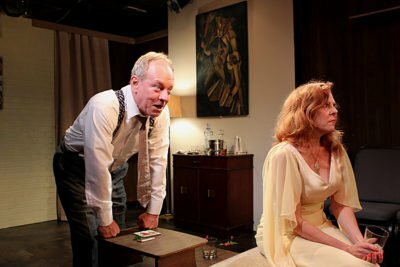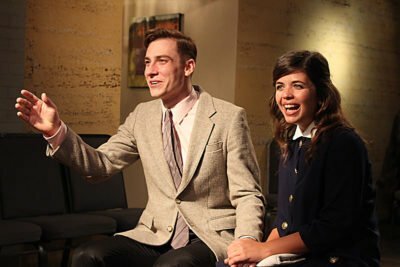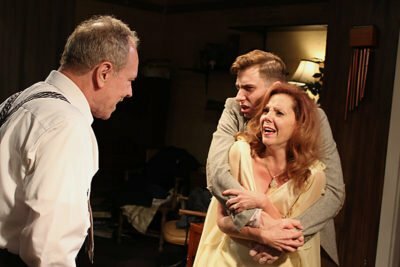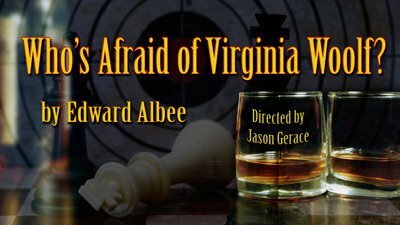Who’s Afraid of Virginia Woolf?
Directed by Jason Gerace
Produced by Redtwist Theatre
George and Martha Up Close and Personal
With its iconic cruel characters embattled in a twisted game of dominance and delusion, Edward Albee’s 1962 drama Who’s Afraid of Virginia Woolf? is irresistible to actors. Audiences can’t help loving the performances it elicits as well, so productions of it are a common part of the theatre scene. But what makes Redtwist’s production unique is the confined quarters of a venue that, despite being the home of one of the most acclaimed companies in Chicago, is small even by storefront standards. “Intimate,” a word often used to describe ninety-nine seat theatres, seems inadequate. In the production directed by Jason Gerace, we’re seated along the walls of a life-sized living room, with actors so close by, you can see every twitch of their eyelids.

While waiting for the play to begin, we are treated to Eric Broadwater’s set; a horror show of 60s fashion. There are white-painted bricks embedded amid laminate wall panels, colorless curtains, and numerous paintings that look like board games, including one quietly intense masterpiece that may have started life as Candyland. “What a dump,” indeed, but it’s both comical and very sad how assiduously these versions of George and Martha have kept up with the latest in bad taste. The main characters are played by company members Brian Parry and Jacqueline Grandt, who, fresh from amazing performances in Red and Good People, respectively, are in top fighting form. From their first appearance, drunkenly snickering and flirting after arriving home at 2:00 am from a party with George’s fellow academics at the university Martha’s father presides over, we can be assured that Gerace’s production captures his characters’ full humanity; their tenderness and vulnerability, as well as their wrath and resentment.

Martha informs George that she has invited a younger couple from the party over, and they’ll be arriving at any minute. George isn’t pleased, but making each other uncomfortable is one of several twisted games he and Martha play. When Nick (Stephen Cefalu Jr.), a biology teacher Martha was sure taught math, and his wife Honey (Elizabeth Argus) arrive, George informs them that Martha’s tastes have simplified over the years so that, while she once drank expensive and exotic cocktails, she now swigs liquor just to stay drunk. When Nick reveals his ignorance of Greek mythological references, George shifts to humiliating him as well, searching for all sorts of ways to assert his superior intellect in a falsely friendly manner. But it is quickly apparent that he feels threatened by the younger, handsome professor, and is seething with jealousy.
Nick would leave right then, but for two things. One is that Martha still wants him to stay, and as the university president’s daughter, it would be better not to offend her. The more troubling, to him, is that Honey has gotten disgustingly drunk, and besides being difficult to transport, Nick forges a strange bond with George by complaining about her. The wiser part of him knows he shouldn’t be giving anything away to these people, but his ego is drawn to beating George at his own game. Though playing George and Martha obviously requires Parry and Grandt to be in top form for three hours straight, Cefalu does a remarkable job of holding his own with them. Initially appalled by his hosts, Nick attempts to play George and Martha off each other, but gradually becomes bolder, and while in over his head, holds his meaner, more experienced adversaries off for a while. It is easy to see why George fears he may be a younger version of himself only with more potential, but for Nick’s lack of an equally strong wife. Argus is an amusing Honey, as you never know whether she will deliver a line sarcastically, with drunken ditzy sincerity, or willful nastiness, but she fades in the three-way crossfire.

It is a tribute to Gerace’s skill as a director that though the alliances and tone of the play constantly shift, each change is logical and easy to follow. Parry mostly speaks in a low, contemptuous hiss, even when George learns Martha has broken the most important rule of their relationship. But when she humiliates him with his professional mediocrities and artistic failures, his meltdown is so wretched an audience can’t help but pity him. Grandt’s Martha is more outwardly charming—she still enjoys some sensual pleasures, at least—and since her intellect is considerable, she’s more than a little embarrassed to have to resort to seducing Nick to provoke George further. Grandt uses her monologue at the beginning of the third act to show how used Martha is to amusing herself through make-believe; she casually carries forth an imaginary conversation with her father as a means of self-examination. For all her faults, it’s quite believable in this production that she was once a happier person. Albee understood that what makes fights between couples truly agonizing is when they are still in love, even as they try to destroy each other. George and Martha still have senses of humor, and occasionally, are even allies. The tragedy of such talented people battling instead of co-operating is what makes Who’s Afraid of Virginia Woolf? a masterpiece, and the Redtwist production has very talented people to let us examine closely.
Highly Recommended
Jacob Davis
This show has been Jeff recommended.
Playing at Redtwist Theatre, 1044 W Bryn Mawr, Chicago. Tickets are $30-35 with discounts for students and seniors. To order, call 773-728-7529 or visit redtwist.org. Playing Thursdays-Saturdays at 7:30 pm and Sundays at 3:00 pm through October 11. Running time is three hours, with two intermissions.

